
As Texas inmate John Hummel was executed on Wednesday evening for killing his pregnant wife, 5-year-old daughter, and father-in-law in 2009, Cantor Michael Zoosman was reciting Kol Nidre to a crowd of protestors at the U.S. Supreme Court.
Zoosman, a former prison chaplain and founder of L’chaim! Jews Against the Death Penalty, says he recited the sacred Yom Kippur prayer to “atone for the national sin of the death penalty.” His prayer was part of the 28th annual “Starvin’ for Justice,” a four-day liquid-only fast and vigil starting June 29, co-sponsored by several abolitionist organizations. “The death penalty says infinitely more about our society that allows it than the human beings condemned by it,” he says.
Staked out on lawn chairs in 95-degree heat, the group of about 30 sang, gave speeches and took turns ringing a bell, brought to different vigils for years and tolled whenever an execution takes place in the United States.
This week marked the anniversary of two landmark Supreme Court cases regarding the death penalty: Furman v. Georgia, where the Court held that the death penalty constituted cruel and unusual punishment in the case of an accidental burglary death, and Gregg v. Georgia, where the court held that the death penalty may be employed in extreme criminal cases. The 1972 Furman decision led to a de facto moratorium on capital punishment, which ended with the 1976 decision in Gregg. Today, capital punishment is legal in 27 states.
Zoosman says his opposition to the death penalty comes from “a very deep, spiritual place.” He became interested in the cause when one of his college roommates was sent to prison for attacking a family member. Zoosman visited his friend in prison often. There, he met other prisoners who had changed for the better, but who could have been sentenced to death had they committed their crimes in different states, Zoosman says.
In a 2014 Public Religion Research Institute poll, 57 percent of Jews surveyed said they supported life in prison without the chance of parole over the death penalty for people convicted of murder. Recently, some victims of the 2018 shooting at the Tree of Life synagogue in Pittsburgh sent letters asking Attorney General Merrick Garland not to pursue the death penalty for the gunman.
As the grandchild of Holocaust survivors, Zoosman used to be a supporter of capital punishment because of his belief that heinous murderers like Nazis deserved death. He says his interactions with prisoners convicted of murder changed his mind.
He was also shocked to learn that some of the methods used for execution have Nazi origins. Lethal injections were first used by Nazis in their euthanasia program, Aktion T4, which aimed to eliminate those “unworthy of life.” In June of this year, Arizona drew condemnation from several Jewish organizations after refurbishing their gas chamber and purchasing materials to make hydrogen cyanide gas, which was used in concentration camps. Zoosman doesn’t equate capital punishment with the Holocaust, but he does see it as a continuation of the Nazi legacy. “When I learned where lethal injection comes from, that just absolutely horrified me,” Zoosman says.
After attending seminary school, Zoosman became a cantor at a synagogue in Vancouver and a chaplain for all of the federal prisons across British Columbia. He then became a chaplain at Saint Elizabeths Hospital, a federally operated psychiatric hospital in Washington, DC.
Seeking to fill a gap in Jewish activism surrounding the death penalty, Zoosman started L’chaim: Jews Against the Death Penalty this year. The group has almost 1,000 members on Facebook. “I’ve witnessed people who are found to be sane try to commit suicide because of the horror of facing a specific time of death,” Zoosman says. “It really is torture.”
Nineteen-year-old Alli Sullivan, an attendee at the vigil, became involved in the cause after closely following the 2020 execution of Brandon Bernard, who was convicted of murder when he was 18 years old. Despite being a stranger to Bernard, Sullivan sent his family a letter and care package. When Sullivan heard news of Bernard’s death, she attended his funeral on Zoom.
“I was sitting in my mom’s car for three hours, bawling my eyes out,” Sullivan says. “I couldn’t believe that people would take the life of somebody that had shown such genuine effort into making sure he was not that same person.”
During the week of the protest, Attorney General Merrick Garland ordered a temporary halt to any further scheduling of federal executions. Ultimately, Zoosman says he hopes the Supreme Court will rule the death penalty unconstitutional. For now, he writes letters to prisoners on death row every day.
Top photo: Cantor Zoosman reciting Kol Nidre. Credit Abraham Bonowitz.

One thought on “Cantor Leads Jewish Movement to Abolish Death Penalty”
Thank you for this coverage, and special thanks to my esteemed colleague Cantor Asa Fradkin for joining me in the chanting of Kol Nidrei. This event was co-sponsored by the thousands of Jewish clergy in T’ruah: The Rabbinic Call for Human Rights. We remember these prophetic words of Holocaust survivor and poet laureate Elie Wiesel, z’l (1928-2016): “With every cell of my being and with every fiber of my memory I oppose the death penalty in all forms. I do not believe any civilized society should be at the service of death. I don’t think it’s human to become an agent of the angel of death.”